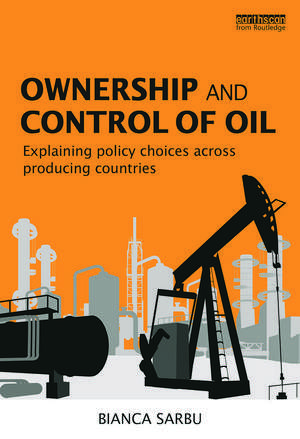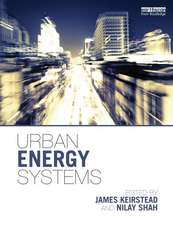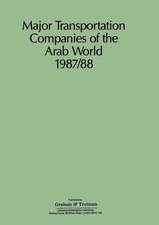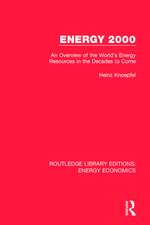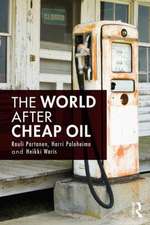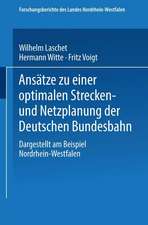Ownership and Control of Oil: Explaining Policy Choices across Producing Countries
Autor Bianca Sarbuen Limba Engleză Hardback – 6 mai 2014
- What are the motives for which some producing states opt for less and NOT more control of their oil production sector?
- When can International Oil Companies enter the upstream industry of producing states and under what conditions?
This book is intended for both specialists and general readers who have an interest in the issue of government control of the petroleum industry. Due to its multidisciplinary approach, the book is aimed at a large academic public composed of scholars of Political Science, International Political Economy, Comparative Politics, and Middle East Area Studies. Moreover, this book should be relevant to international consultants, industry professionals and decision-makers in countries assessing their experience with existing control structures as well as the many countries in the process of joining the ‘petroleum club’ of oil producing nations.
Preț: 262.14 lei
Preț vechi: 327.62 lei
-20% Nou
Puncte Express: 393
Preț estimativ în valută:
50.17€ • 54.47$ • 42.14£
50.17€ • 54.47$ • 42.14£
Carte tipărită la comandă
Livrare economică 22 aprilie-06 mai
Preluare comenzi: 021 569.72.76
Specificații
ISBN-13: 9780415725996
ISBN-10: 0415725992
Pagini: 218
Ilustrații: 11 black & white illustrations, 13 black & white tables
Dimensiuni: 156 x 234 x 18 mm
Greutate: 0.56 kg
Ediția:1
Editura: Taylor & Francis
Colecția Routledge
Locul publicării:Oxford, United Kingdom
ISBN-10: 0415725992
Pagini: 218
Ilustrații: 11 black & white illustrations, 13 black & white tables
Dimensiuni: 156 x 234 x 18 mm
Greutate: 0.56 kg
Ediția:1
Editura: Taylor & Francis
Colecția Routledge
Locul publicării:Oxford, United Kingdom
Public țintă
Professional and Professional Practice & DevelopmentCuprins
1. Rethinking the Ownership and Control of Oil 1. The Rising and Waning Star of IOCs 2. Empirical Puzzle and Research Question. The Picture since the 1970s 3. The Research Relevance 4. Roadmap 2. Upstream Sector Policy in the Oil Industry 1. The Political Economy of the Oil Sector 1.1. The Institutional Set-Up for Policy-Making in the Oil Sector 1.2. The Commercial versus Non-Commercial Ends of the Range 2. Upstream Sector Policy 2.1. Conceptual Insights 2.2. State Control versus Economic Performance 2.3. Upstream Sector Policy Tools 2.3.1. NOC Creation .2.3.2. Other Tools 2.3.2.1. Legal Arrangements 2.3.2.2. Fiscal Systems 3. Current Readings of Energy Studies and Theory Development 1. Review of Drivers and Drives in the Energy Sector 1.1. Technical Explanations 1.2. Economic Explanations 1.3. Institutional Explanations 1.3.1. Domestic Institutions 1.3.1.1. Preferences in the Domestic Arena 1.3.1.2. Domestic Institutional Constraints 1.3.2. International Institutions 2. The Analytical Framework – Explaining Oil Upstream Sector Policies Worldwide 2.1. The Context 2.2. Domestic Constraints 2.3. Hypotheses 4. A Statistical Analysis of Oil Upstream Sector Policies across the World 1. The Sample 1.1. Sampling Criteria 1.2. Data Construction 2. Data Operationalization and Data Sources 2.1. Dependent Variable: ‘De Facto’ Control as Ratio 2.2. Independent Variables 2.3. Control Variables 3. Statistical Tools 4. Results 4.1. The Context 4.2. Domestic Constraints 4.3. Alternative Explanations 5. Conclusions to the Statistical Analysis 5. Mirroring the Cases of Saudi Arabia and Abu Dhabi 1. Case Selection 2. Primary Data Collection through Semi-Structured Interviews 3. Closed Upstream Sector: Saudi Arabia 3.1. Historical Contingencies 3.2. The Analytical Framework against the Saudi Empirics 3.2.1. The Context 3.2.2. Domestic Constraints 4. Open Upstream Sector: Abu Dhabi 4.1. Historical Contingencies 4.2. The Analytical Framework against Abu Dhabi’s Empirics 4.2.1. The Context 4.2.2. Domestic Constraints 5. Conclusions to the Case Studies 6. Conclusions 1. Comparative Results of the Empirical Analysis 2. Revised Analytical Framework 3. Final Remarks 3.1. Contributions, Limitations, and Research Ways Forward 3.2. Quo Vadis?
Descriere
Ownership and Control of Oil examines government decisions about how much control to exert over the petroleum industry, focusing on the role of National Oil Companies in the production of crude oil since the nationalizations in the 1970s.
